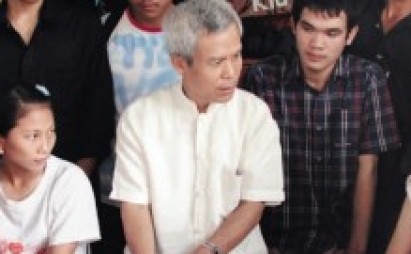Lao govt asked to ‘enable safe return’ of Magsaysay awardee Sombath
Interaksyon: 03 September 2013
 MANILA – Members of an international civil society on Tuesday asked the Lao leadership to “use its extensive resources to enable the safe return of Sombath Somphone to his family.” A development worker, Sombath received the Ramon Magsaysay Award for community leadership in 2005.
MANILA – Members of an international civil society on Tuesday asked the Lao leadership to “use its extensive resources to enable the safe return of Sombath Somphone to his family.” A development worker, Sombath received the Ramon Magsaysay Award for community leadership in 2005.
Tina Ebro, co-coordinator of the Asia-Europe People’s Forum (AEPF), headed a small delegation to the Lao embassy in Makati to deliver a letter expressing the group’s “concern” over Sombath’s disappearance on December 2012. Aileen Bacalso, head of the Asian Federation Against Involuntary Disappearances, was part of the delegation.
“Sombath’s continuing disappearance is a matter of regional and international concern. We emphasize that an enforced disappearance constitutes a crime under international law. The Lao authorities’ handling of this case and their sincerity and success in ensuring the safe return of Sombath is the test by which their commitment to upholding human rights will be judged,” AEPF said in the letter.
“We are of the opinion that the Lao Government is in breach of its human rights commitments, due to the enforced nature of Sombath’s disappearance, as it fails to ensure the safe return of Sombath and as restrictions on civil society continue,” AEPF added.
The letter is addressed to Lao President Choummaly Sayasone, Lao Prime Minister Thongsing Thammavong, Lao Foreign Affairs Minister Dr Thongloun Sisoulith, and President of the Lao National Assembly Pany Yathortou.
Founder and former director of the Participatory Development Training Center (PADETC) in Laos, Sombath headed the national organizing committee of the AEPF-9 held in Vientiane October last year before the Asia-Europe Meeting (ASEM).
“Sombath is one of the most respected and influential voices for sustainable people-centred and just economic and social development in Laos,” AEPF said in the letter, also sent to 11 other Lao embassies in Asia.
The letter reminded the Lao officials that the European Union, the United Nations, and other bilateral and multilateral donors have expressed concern over Sombath’s disappearance.
“As long as Sombath has not been returned safely to his family, many organizations and individuals are committed to continuing international activity and ensuring that his disappearance will dominate bilateral, multilateral, and international discussions with and about Laos,” AEPF said.
Sombath disappeared on December 15, 2012. He was taken away in a truck by unknown persons after being stopped by policemen at a police outpost in Vientiane. His abduction was captured by a CCTV camera positioned near the police outpost. Nobody has seen or heard from him since.
There have been repeated inquiries through diplomatic channels and two delegations of parliamentarians to Laos, one from the Association of Southeast Asia Nations (ASEAN) and one from the Europe Union (EU).
On 21 December 2012, the Office of the United Nations High Commissioner for Human Rights (OHCHR) said Sombath’s disappearance appeared to be enforced. In June2013, it reiterated its concern at the Human Rights Council Working Group on Enforced or Involuntary Disappearances on the lack of progress in Sombath’s case.
On 6 February 2013, the European Parliament unanimously passed a resolution calling on the EU to include Laos and Sombath’s disappearance in its priorities for forthcoming sessions of the United Nations Human Rights Council.
In June 2013, Amnesty International issued a major briefing document on Sombath’s disappearance which said: “Based on the evidence, the most plausible conclusion is that Sombath Somphone is a victim of an enforced disappearance, for which Lao officials are responsible.”
In the letter, Ebro also asked the Lao government to ratify the International Convention for the Protection of All Persons from Enforced Disappearance which prohibits enforced disappearance. Laos is a signatory to the CPED but has not yet ratified it.
“As a signatory to the Convention, Laos is expected to act according to the spirit of its provisions and has the obligation to refrain from any actions that may defeat the object and purpose of the Treaty prior to its entry into force,” AEPF said.
